Create a folder in a document library
Applies To
SharePoint Server Subscription Edition SharePoint Server 2019 SharePoint Server 2016 SharePoint in Microsoft 365Creating folder in a SharePoint document library is one way to group and manage files. You can create folders from your device when syncing or from the command bar on the web.
Create a folder in SharePoint
-
Go to the SharePoint site, and where you want to create a new folder, open the SharePoint document library.
-
On the menu bar, select + New, and then select Folder.
If you don't have Folder as an option on the + New menu, it might be turned off. A library owner or a user with design permissions can enable the Folder command.
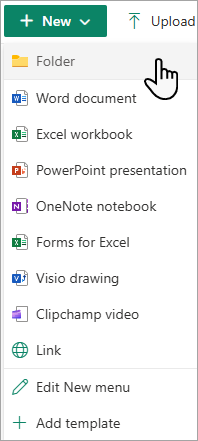
Note: Does your screen look different than the images in this article? Your SharePoint administrator might have SharePoint Classic experience set on your document library.
-
In the Create a folder dialog box, enter a folder name in the Name box, and then select Create.
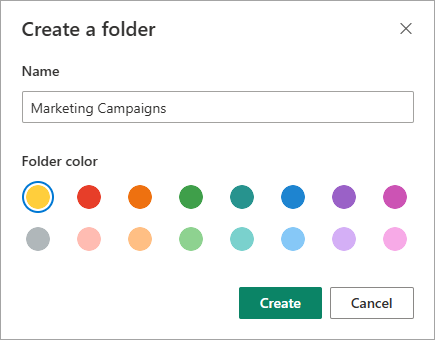
Note: To change the folder name later on, select the ... (ellipsis) next to the folder name, and then select Rename. Change the folder name in the Rename dialog box, and then select Update. For more info, see Rename a file, folder, or link in a document library.
When done, you should see your new folder in the document library and can start adding files or creating subfolders within it. To add a new file, see Create a new file in a document library. To upload existing files, see Upload, view, and remove project files or documents.

-
If you don't see your new folder in the library, refresh your browser.
In some cases, you might consider using views instead of folders. You can filter, group, and sort files in views. If you have a large library, a combination of views and folders might work best.
Turn on folders in SharePoint or SharePoint Server 2019
Folders are turned on by default, but if they're off and you have permissions, follow these steps:
-
Open the library where you want to start adding folders.
-
Select Settings

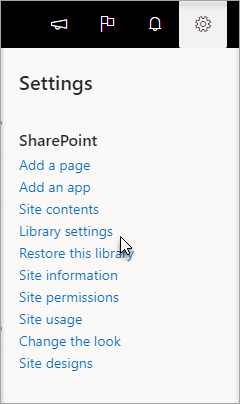
-
Select Advanced settings.
-
In the Folder section, for Make "New Folder" command available,make sure that the Yes option is selected.
-
Select OK and navigate back to your library.
Note: Designers can modify the appearance and navigation of a site significantly. If you can't locate an option, such as a command, button, or link, contact your admin.
Create a folder in a SharePoint Classic experience library
-
Go to the SharePoint site containing the SharePoint library where you want to add the folder.
-
Select the title of the library on the Quick Launch bar to open it, or select Settings

Note: Designers can modify the appearance and navigation of a site significantly. If you can't locate an option, such as a command, button, or link, contact your admin.
-
On the ribbon, select Files, and then in the New group, select New Folder.

Note: If the New Folder command isn't available, you can turn it back on with the proper permissions. On the Library tab of the ribbon, select Library Settings, and then select Advanced settings. In the Folder section, for Make "New Folder" command available, make sure that the Yes option is selected.
Note: To change the folder name later on, select ... (ellipsis) in the dialog box, and then select Rename. Change the folder name in the Name box, and then select Save.
-
In the Create a folder dialog box, enter a folder name in the Name field, and then select Create.
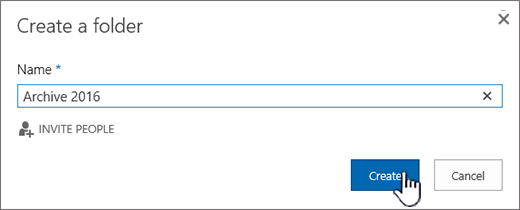
You can optionally invite people to share the folder.
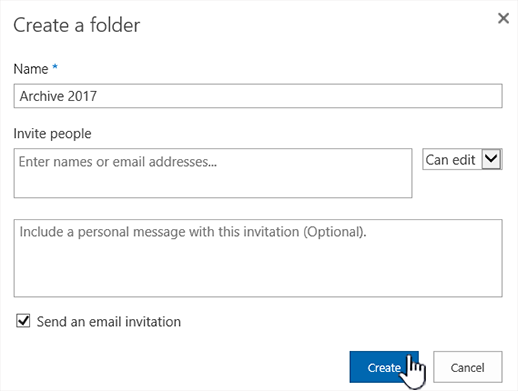
For more info, see Share SharePoint files or folders.
Depending on your situation, you might consider using views instead of folders, because they enable content to be filtered, grouped, and sorted in multiple ways. If you have a large library, a combination of views and folders might work best. For more info about views, see Video: Create and edit public views of a list or library.
Create a folder in SharePoint Server 2016
By default, the New Folder command is turned on in SharePoint document libraries. A library owner or a user with design permissions can enable the New Folder command.
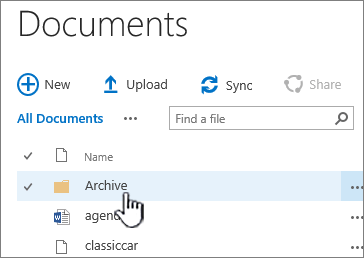
-
Go to the site containing the SharePoint document library where you want to add the folder.
-
Select the title of the library on the Quick Launch bar to open it, or select Settings

Note: Designers can modify the appearance and navigation of a site significantly. If you can't locate an option, such as a command, button, or link, contact your administrator.
-
On the ribbon, select the Files tab, and then in the New group, select New Folder.

Notes: If the New Folder command isn't available, you can turn it back on with the proper permissions.
-
On the Library tab of the ribbon, select Library Settings, and then select Advanced settings.
-
In the Folder section, for Make New Folder command available, ensure that the Yes option is selected.
-
Select OK.
-
-
In the New Folder dialog box, enter a folder name in the Name field, and then select Save.
You can optionally invite people to share the folder.
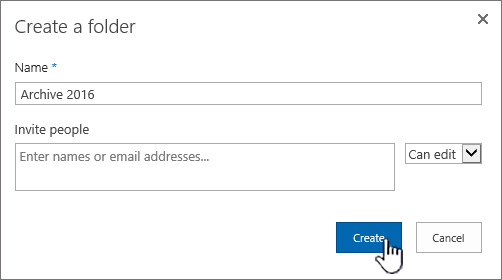
For more info, see Share documents or folders in SharePoint Server.
-
When you're done, select Create.
Notes:
-
To change the folder name later on, select ... (ellipses), and in the dialog, select ... (ellipses), and then select Rename. In the Name field, change the folder name.
If you don't see Rename, select Edit Properties, and change the Name field. When done, select Save.
-
To quickly go to the next level up in the folder hierarchy, on the ribbon, select the Library tab, and then select Navigate Up.
Depending on your situation, you might consider using views instead of folders, because they enable content to be filtered, grouped, and sorted in multiple ways. If you have a large library, a combination of views and folders might work best. For more info about views, see Video: Create and edit public views of a list or library.
Other topics on Folders and files
Move or copy files in SharePoint
Delete a file, folder, or link from a SharePoint document library
Leave us a comment
Was this article helpful? Was it missing content? If so, please let us know what's confusing or missing at the bottom of this page. Please include your version of SharePoint, OS, and browser. We'll use your feedback to double-check the facts, add info, and update this article.










